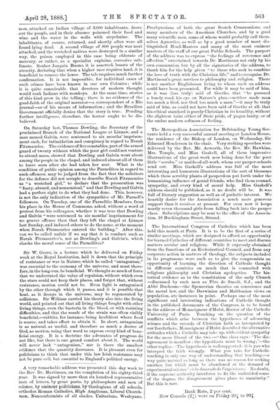Sir W. Grove, in a lecture which he delivered on
Friday week at the Royal Institution, laid it down that the principle of resistance or war in Nature, which he called "antagonism," was essential to the economy of the universe, and must there- fore, in the long-run, be beneficial. We thought so much of force that we underrated the value of repulsion, without which even the stars could not keep their places, and forgot that, without resistance, motion could not be. Even light is antagonised by the ether through which it passes, and it is possible that heat, as it decays in the universe, may be regenerated by collisions. Sir William carried his theory also into the living world, and pointed out that all living things fought with other living things, even the bacteria in the blood, or with resisting difficulties, and that the result of the strain was often visibly beneficial,—rabbits, for instance, being healthiest where food is scarce, and takes effort to obtain it. In short, antagonism is as natural, as useful, and therefore as much a decree of God, as motion, using that word to express every kind of bene- ficial energy. It is a doctrine the advocates of progress do not like, but there is one grand comfort about it. The world will never lack "antagonism," nor is there the smallest evidence that the quantity decreases. It is pleasant even for politicians to think that under this law Irish resistance may not be pure evil, but essential to England's political energy.


































 Previous page
Previous page